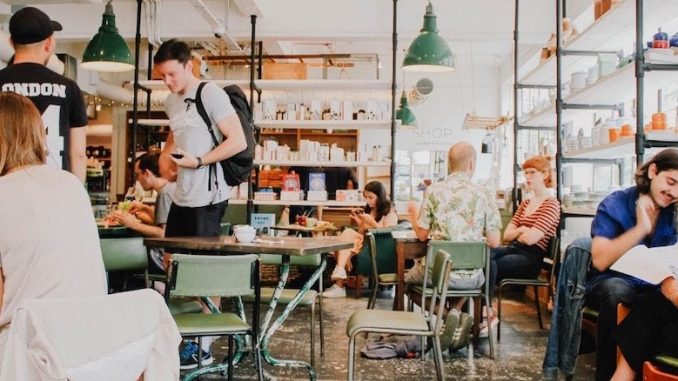
An employee workshop by Ritual Coffee Roasters prepares baristas for potential customer conflict in the café space.
BY ALEXA ROMANO
SPECIAL TO BARISTA MAGAZINE ONLINE
Ritual Coffee‘s flagship café is in the heart of San Francisco’s vibrant Mission District, an area that has recently experienced a higher rate of challenging customer interactions. Before the pandemic, café goers crowded inside Ritual Coffee’s café, and even today, socially distanced customers flock to its outdoor space awaiting their coffee.
Recently, Ritual Coffee has experienced “emergency incidents” in which angry customers have harassed staff and other customers verbally, and sometimes physically. Also contributing to customer conflict is Ritual’s “no masks no service” policy, which opposes California’s current CDC-influenced guidelines that allow vaccinated people to go unmasked while outdoors. Thus, more and more vaccinated customers angrily announce their frustration about mask use. What happens as more customer conflicts occur? What will happen when café doors open and customers are closely interacting in small indoor spaces?
Ritual Coffee’s leadership team has assembled a response and de-escalation plan should similar incidents occur. As an employee of Ritual Coffee, I recently attended a workshop designed to prepare employees to handle disturbing incidents. I wanted to share the insights from this workshop as a helpful resource for those cafés experiencing similar encounters and for those considering reopening.
Five Steps to Prepare for Emergency Incidents
Emergent incidents in the workplace may be defined as any encounter that affects someone physically and/or emotionally. Incidents are characterized by anything that postpones service and demands a collaborative response. The following five steps were suggested at the workshop as a guide for incident response:
Know how to identify the situation
Correctly identifying the situation is key to responding effectively. This is no easy task since there are all sorts of different behaviors that compel staff to intervene. You can ask yourself questions such as: Does anyone need medical attention? Is there violence occurring or imminent? Are there physical assaults, verbal abuse, or threats? Is loudness argumentative or has it crossed the line into aggression?
Because incidents can escalate quickly, it is advantageous for staff to know in advance how to create physical barriers, whether by closing the front doors, moving the service counter, or using whatever features are unique to a café’s environment. If the situation endures, employees should immediately alert the other customers and even stop service to address the incident at hand.
Get to know how you and your staff respond in certain situations
Depending on the situation, employees can determine what action to take; however, there are many ways to respond to the same situation. Reflecting on your personal tendencies in critical situations is useful for incident preparation. It’s also important to identify what prompts your own emotional activation. Furthermore, while others may react differently than you, or have a different emotional capacity, it is still extremely important to show support for those around you. Make sure that everyone knows that asking for help or assistance is OK.
Integrate de-escalation techniques
Even before the pandemic, Ritual Coffee held mandatory de-escalation trainings for new employees. These trainings taught ways to handle aggressive or uncomfortable customer interactions. In an attempt to de-escalate a situation, a critical method is determining the provoker’s behavior and then acting upon it.
There are two main methods: verbal and nonverbal cues. Verbal cues include listening actively, avoiding interrupting, offering to bring a manager into the conversation, calling for co-workers to stand close by, and remaining calm. Additionally, avoid power statements like, “You must calm down.” These statements can increase aggression in someone already showing signs of aggression.
Nonverbal cues include increasing awareness, avoiding crossed arms, and maintaining space. Communicating self-control, calmness, and intention is important in minimizing aggression in someone who is showing aggression toward you.
Know your emergency points of contact
In the moment of crisis, employees should know who and how to call someone should the situation escalate beyond their own control. The café’s manager, the company’s CEO, and the mobile crisis team’s contact information should be accessible to employees working on the floor. Ritual Coffee’s Mission location manager, Bean Tupou, has assembled a list of community-based alternatives to calling the police, which can be uniquely seen in different cities here. Another idea that Ritual Coffee suggests is devising scripts for aggressive customer interactions to help facilitate or achieve de-escalation.
When to call the police?
Sometimes, it is difficult to assess when the right time comes to call in the police. Ritual’s staff, with years of experience working in the hectic Mission District, feels that a police presence can sometimes escalate a situation. Many feel uncomfortable bringing the police into the café with so many intersecting demographics for many reasons; that’s why we have a list of local non-police alternatives to call first. However, there are certainly times when police involvement is needed. Ritual Coffee’s guidelines for police intervention include when there is someone with a weapon on or near the premises (especially for active shooters) or when there is a robbery.
Note: Let a robbery in the moment happen; human safety comes first.
Follow post-incident protocol
After an incident, employees, or a manager, should fill out an incident report. Supervisors should follow up with the staff and discuss feedback. The staff should reflect with the supervisor on what worked and what did not after the incident. Staff and community should continuously add more resources to the list for incident response too. In addition, cafés might find it helpful to create committees so that employees can have and create a proactive space to plan more workshops, events, policies, or resources oriented toward incident response.
Final thoughts
The goal of the de-escalation and incident response workshop was to get everyone who may be working in the café during the moment of crisis on the same page. The staff should be prepared to respond, as we anticipate an increasing number of social interactions and indoor café reopenings. As Ritual café manager Bean states, “Sharing these experiences, brainstorming more solutions, and not minimizing the stress of the situation are all really important to coming up with solid solutions that work for us all.”

Alexa Romano (she/her) is a recent graduate from Stanford University with an MA and BA in Cultural and Social Anthropology with a double minor in Ethics in Society and Photography. Her research investigates the coffee commodity chain and looks at the mystified, obscured, and ethical/ unethical relations that tether producer societies to consumer societies with a particular focus on Costa Rican smallholder producers. In addition to freelance writing, Alexa is a HIIT instructor with a wellness tech company. Currently, she is learning barista skills at Ritual Coffee in San Francisco. See Alexa’s work here.

